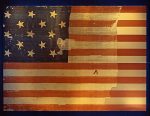![[Lexington-Concord Stamp]](https://riverhouses.org/wp-content/uploads/2020/04/lexington-concord-stamp-1975-300x240.png) This is one of our special homeschool history weeks in the River Houses: the week of the 19th of April, the day the American Revolution began in 1775.
This is one of our special homeschool history weeks in the River Houses: the week of the 19th of April, the day the American Revolution began in 1775.
If you’d like to teach some Revolutionary American history in your home academy this week, here’s a carefully prepared online collection of original documents, lesson plans, and open-ended discussion questions assembled by history teacher James Walsh of Scott County High School in Kentucky, all ready to go for you and your students:
The United States declared its independence in 1776, but to understand independence, students need to understand the events that led up to it. That’s what this collection of primary source materials and discussion questions will help them do.
After the conclusion of the French and Indian War in 1763, relations between the American colonists and the British Crown and Parliament quickly deteriorated. By 1776, many of the colonists, and representatives of all 13 colonies, were ready to declare their independence and take up arms. This set of sources focuses on a selection of events, legislation, and perspectives from both sides during this time period. The documents, images, and artifacts help the student-historian understand the process of going from loyal subjects of the British Crown to rebels willing to risk their lives. Through this inquiry, together with other knowledge, the student should be able to understand the background of America’s Revolution and some of the factors leading to all revolutions. (Road to Revolution)
The primary sources available for study include engravings and illustrations, private letters, official documents, and even a politically contentious colonial teapot. ☕️
What other historical events and American anniversaries are you and your students examining in your homeschool this Leo Term? 😊
❡ Explore more: For a quick homeschool review of the American Revolution, turn to page 289 in your River Houses history encyclopedia. 📚
❡ Come, here’s the map: History and geography are always closely intertwined. Be sure to have your homeschool atlas out and open for your students as they explore this (or any other) historical topic. 🗺
❡ Stay in the loop: This is one of our occasional posts on Homeschool Holidays & History. Add your name to our weekly mailing list and get great homeschool teaching ideas delivered right to your mailbox all through the year. 📫
❡ Homeschool calendars: We have a whole collection of free, printable, educational homeschool calendars and planners available on our main River Houses calendar page. They will help you create a light and easy structure for your homeschool year. Give them a try today! 🗓
❡ Support our work: If you enjoy our educational materials, please support us by starting your regular Amazon shopping from our very own homeschool teaching supplies page. When you click through from our page, any purchase you make earns us a small commission at no extra cost to you. Thank you for helping us to keep going and growing! 🛒
❡ Join us! The aim of the River Houses project is to create a network of friendly local homeschool support groups — local chapters that we call “Houses.” Our first at-large chapter, Headwaters House, is now forming and is open to homeschoolers everywhere. Find out how to become one of our founding members on the Headwaters House membership page. 🏡




